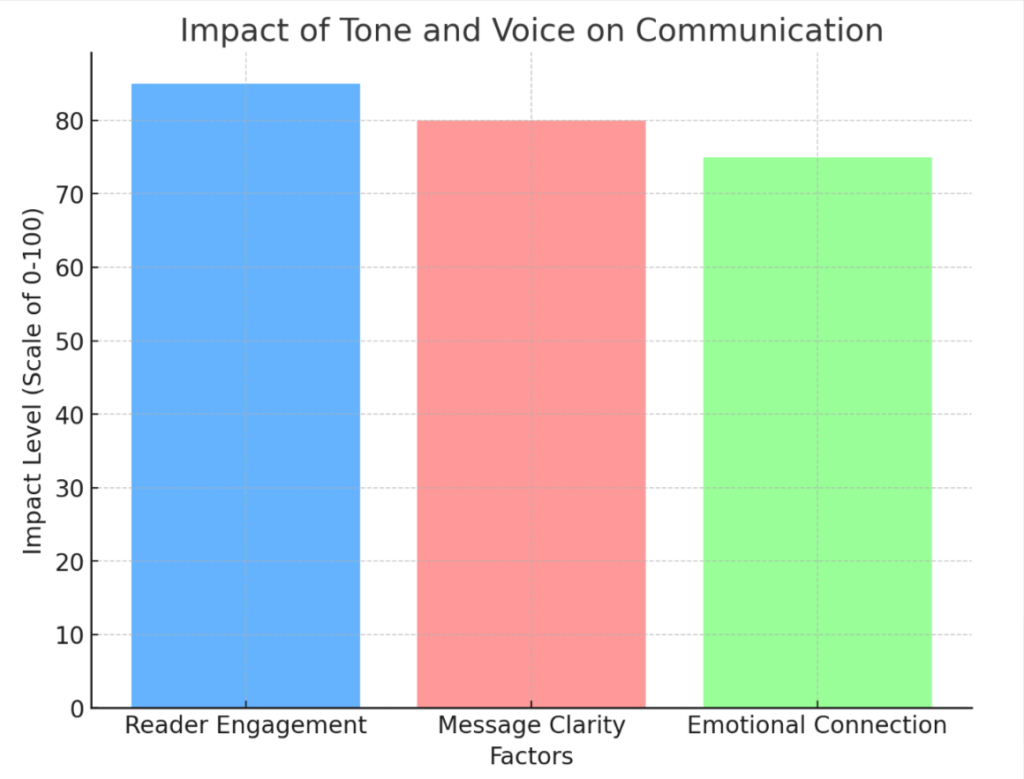Fine-Tuning Your Writing: The Importance of Tone and Voice
Do your words often fail to convey the true intent of your message? The tone and voice in writing play a crucial role in making sure that’s not a problem. Studies reveal that a well-crafted tone can increase readers’ comprehension and engagement with the content.
This blog post will provide you with practical tips on how to effectively use tone and voice to communicate ideas, evoke emotions, build credibility, and influence your audience. Ready for some game-changing insights? Let’s dive right in!
Key Takeaways
- Tone and voice in writing play a crucial role in conveying the true intent of your message to your audience.
- A well – crafted tone can increase readers’ comprehension and engagement with the content.
- The use of tone and voice impacts the way ideas are communicated, evokes emotions, builds credibility, and influences your audience.
- A strong tone and voice can stir emotions within the reader, influencing their thoughts, feelings, and actions.
- Common mistakes to avoid in tone and voice include using overly formal or offensive language, being inconsistent throughout the piece, neglecting emotional impact, failing to adapt to different contexts or audiences, overusing jargon or industry-specific terms without explanations, and ignoring brevity and clarity in communication.
- Strategies for developing a positive tone and voice include using clear language, showing confidence and authority, tailoring your tone to the audience, injecting emotion when appropriate but not overdoing it,
- Additional resources for further learning about improving tone
Understanding Tone and Voice
Tone and voice are crucial elements in effective writing because they impact the way ideas are communicated to the audience.
Definition of tone and voice
Tone in writing signifies the writer’s attitude towards the subject and audience. It may be formal, informal, serious, satirical or any other type of emotion that conveys the writer’s perspective.
Voice on the other hand, represents an author’s style, displaying their personality and character through words. In essence it is how you ‘say’ what you’re saying in print.
Importance of tone and voice in effective writing
In any effective writing, the tone and voice play a pivotal role. They serve as the writer’s identity – shining through words, painting emotions and creating rapport with readers. A suitable tone can boost credibility while also providing persuasive appeal to keep the audience engaged.
Additionally, it gives clarity to ideas making communication easy and effortless. Whether you’re drafting an emotional narrative or an authoritative article; your tone sets its mood while your ‘voice’ showcases your unique style.
Wrongly used, they can distort meaning leading to miscommunication hence writers need to finely analyze which appropriate tone matches their message for optimum influence over their audience.
Strategies for honing this skill will not only improve readability but catapult your overall writing effectiveness too!
Impact of Tone and Voice on Communication

The tone and voice used in writing can greatly impact the effectiveness of communication by influencing how the audience receives and interprets the message.
How tone and voice can affect the audience
A strong tone and voice in writing can stir emotions within the reader. They work as powerful tools to influence the audience’s thoughts, feelings, and actions. A carefully selected tone might spark joy, instill fear, or even provoke anger.
This emotional response plays a crucial role in how the content is received.
The tone also impacts credibility and authority of the writer. An authoritative, confident voice imparts trust on readers; they feel more inclined to believe what’s been written. Meanwhile a casual conversational tone creates a sense of familiarity and rapport with your audience which may enhance reader engagement.
It is through this delicate balance of emotions that writers effectively communicate with their audiences.
Common mistakes to avoid in tone and voice
- Using overly formal or technical language that alienates the audience and makes the writing difficult to understand.
- Being inconsistent with tone and voice throughout the piece, which can confuse and disengage readers.
- Neglecting to consider the emotional impact of the chosen tone, leading to misinterpretation or a lack of connection with the audience.
- Failing to adapt the tone and voice to suit different writing contexts or target audiences, resulting in a disconnect between the writer and reader.
- Using an inappropriate or offensive tone that can offend or upset readers, damaging credibility and rapport.
- Overusing jargon or industry – specific terms without providing adequate explanations, excluding readers who may not be familiar with them.
- Ignoring the importance of brevity and clarity in communication, leading to convoluted and confusing writing.
- Disregarding cultural differences in tone and voice, risking misinterpretation or offending readers from different backgrounds.
Remember: By avoiding these common mistakes, writers can effectively engage their audience, communicate their ideas with clarity, and establish credibility and authority through their writing style and tone.
Enhancing Tone and Voice for Effective Writing
Developing a positive tone and voice can significantly improve the effectiveness of your writing.
Strategies for developing a positive tone and voice
Developing a positive tone and voice in your writing is crucial for effective communication. Here are some strategies to help you achieve this:
- Use clear and concise language: Write in short sentences and avoid unnecessary jargon or complex vocabulary that may confuse your audience.
- Show confidence and authority: Use strong and assertive words to convey your expertise on the topic, which will help build credibility with your readers.
- Tailor your tone to the audience: Consider who you are writing for and adjust your tone accordingly. For example, if you are addressing a professional audience, maintain a formal tone, whereas a more casual tone might be appropriate for a personal blog post.
- Inject emotion when needed: Emotions can add depth and impact to your writing, so don’t shy away from using them when appropriate. However, be cautious not to overdo it or come across as overly dramatic.
- Be conversational: Writing in a conversational manner can make your content more engaging and relatable to readers. Imagine you are having a conversation with someone while writing, which will make your tone feel natural and approachable.
- Edit and revise: Tone and voice can be refined through careful editing. Take the time to review your work, removing any unnecessary formalities or inconsistencies in tone that may have crept in during the writing process.
Resources for further learning
To further enhance your understanding and mastery of tone and voice in effective writing, consider exploring these resources:
- Writing Style Guides: Consult renowned style guides such as The Associated Press (AP) Stylebook or The Chicago Manual of Style for comprehensive insights on language usage, grammar, punctuation, and more.
- Writing Workshops: Attend writing workshops or webinars offered by professional organizations or reputable institutions to refine your communication skills and learn practical techniques for improving tone and voice.
- Online Writing Communities: Join online writing communities and forums, like Reddit’s r/writing or Medium’s Writing Cooperative, to engage with fellow writers, share experiences, receive feedback, and discover valuable tips from experienced authors.
- Books on Writing: Explore renowned books on the craft of writing, such as “On Writing Well” by William Zinsser or “Bird by Bird” by Anne Lamott, which offer invaluable guidance on developing a distinctive voice and connecting with readers.
- Blogs and Podcasts: Follow established writing blogs like Writer’s Digest or listen to podcasts like “The Creative Penn” hosted by Joanna Penn to access a wealth of advice from industry professionals, including tips on refining your tone and voice.
- Online Courses: Enroll in online courses specifically focused on developing effective communication skills, persuasive writing techniques, or crafting engaging content that resonates with diverse audiences.
Conclusion
In conclusion, understanding and utilizing the appropriate tone and voice in writing plays a crucial role in effective communication. By analyzing and improving our writing style, we can enhance our credibility, authority, and emotional appeal to connect with our audience more effectively.
Developing a positive tone and voice is essential for building rapport, influencing others, and achieving writing clarity. With the right approach to tone and voice, writers can create meaningful content that resonates with their readers.

